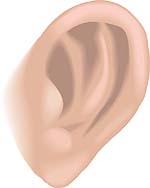Auditory-Linguistic Dyslexia

Generally speaking, the auditory-linguistic dyslexic tends to perform poorly in several language-related functions. According to Denckla, Mattis, and Pirozzolo, such a child has a lower Verbal (usually below IQ 90) than a Performance (usually at least IQ 95) score on a standardized test such as the WISC-R. Critchley and Pirozzolo noted delayed acquisition of speech and language skills, while Denckla and Mattis observed naming difficulties as well as repetitive, circumlocutory or paraphasic speech. Pirozzolo named difficulties in sight-sound associations, short-term verbal memory deficits, difficulty recalling orally given instructions, and slow and laborious reading. Critchley presented evidence of vocalization and lip movement during silent reading. Because of the associated semantic and syntactic disorders observed in the speech and writing of the adult dyslexic, Critchley described such an individual as "too often lame in his manipulation of language symbols." By and large, these dyslexics lack phonic word-attack skills and prefer visual activities such as whole-word sight reading.
Among the manifestations which characterize the auditory-linguistic dyslexia, according to author Saroj D. Sutaria (Specific Learning Disabilities: Nature and Needs), are difficulties in sound-symbol association, auditory discrimination difficulties, problems in auditory analysis and synthesis, auditory sequencing difficulties, auditory memory problems, omissions, additions and substitutions, mispronunciations and hesitations and repetitions.
- Sound-symbol association problems
- Auditory discrimination difficulties
- Difficulties in auditory analysis and synthesis
- Auditory sequencing difficulties
- Auditory memory problems
- Omissions, additions, substitutions
- Mispronunciations
- Hesitations and repetitions
|
